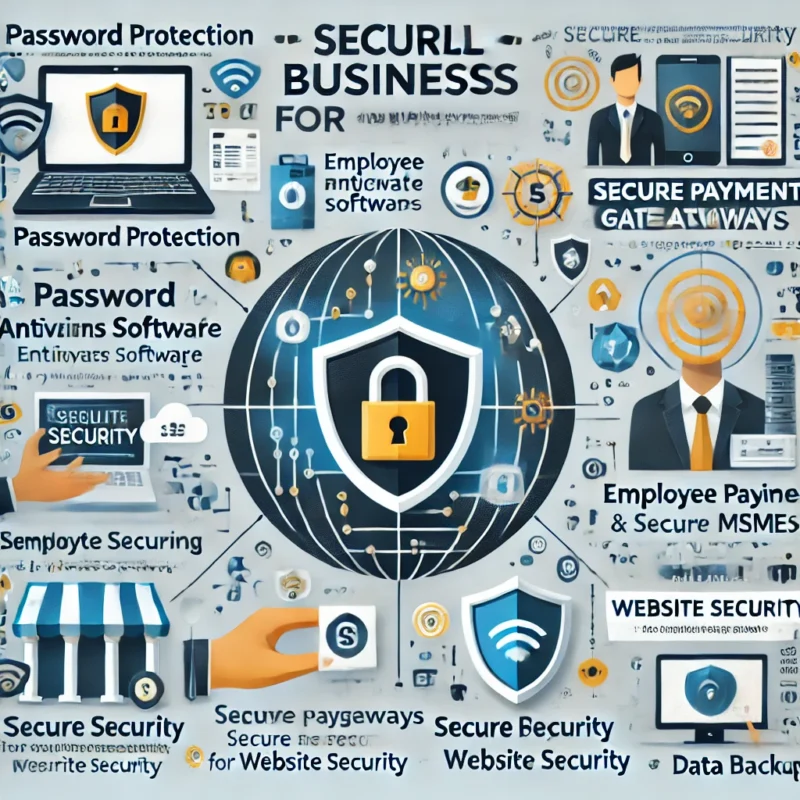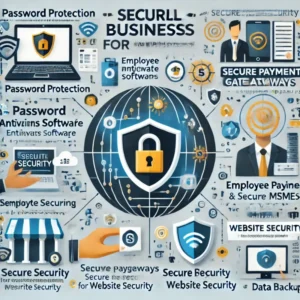As small businesses in India embrace digitization—from digital payments and cloud accounting to online stores—they also become prime targets for cyberattacks. Whether you run a boutique, a small IT firm, or a retail outlet, cybersecurity is no longer optional—it’s essential.
Why Cybersecurity Matters for Indian Small Businesses
According to CERT-In, India recorded over 1.3 million cyber incidents in 2022 alone, and a significant portion affected small and mid-sized businesses.
Why? Because small businesses often:
- Lack dedicated IT teams
- Use outdated software
- Have weak password policies
- Don’t invest in employee training
The result? Financial loss, legal risks, and data theft.
10 Cybersecurity Tips for Indian Small Businesses in 2025
✅ 1. Use Strong Passwords and Two-Factor Authentication (2FA)
Set policies requiring employees to use:
- Complex passwords (8+ characters with symbols & numbers)
- Password managers like Bitwarden or LastPass
- Two-factor authentication for email, banking, and admin logins
Pro Tip: Change passwords every 3-6 months.
✅ 2. Keep All Software Updated
Outdated software is a gateway for hackers.
Regularly update:
- Operating systems (Windows, macOS, Android)
- Antivirus and firewall software
- Business tools like billing, CRM, or email apps
Enable auto-updates wherever possible.
✅ 3. Invest in Basic Antivirus & Firewall Protection
Use reliable antivirus software like:
- Quick Heal
- Kaspersky
- Norton
- Bitdefender
Install firewalls to block unauthorized access to your network.
✅ 4. Back Up Your Data Regularly
Automate daily or weekly backups for:
- Financial records
- Customer data
- Emails and files
Use cloud storage services like Google Drive, Dropbox, or OneDrive for secure backups.
✅ 5. Educate Your Employees
Most cyberattacks happen due to human error.
Train your team to:
- Spot phishing emails
- Avoid clicking on suspicious links
- Use strong passwords
- Report incidents immediately
Run quarterly awareness sessions for new hires and teams.
✅ 6. Secure Your Wi-Fi Network
Never leave your Wi-Fi open. Always:
- Use a strong Wi-Fi password
- Change default router settings
- Hide SSID (network name)
- Set up a separate Wi-Fi for customers or guests
✅ 7. Limit Admin Access
Not every employee needs access to sensitive files.
Set user permissions for:
- Financial data
- Inventory systems
- CRM and HR records
Use role-based access and monitor activity logs.
✅ 8. Use Secure Payment Gateways
Only use trusted platforms like:
- Razorpay
- Paytm for Business
- PhonePe Business
- CCAvenue
- Cashfree
Ensure your site uses SSL certificates (look for HTTPS in your domain).
✅ 9. Protect Your Website
Your website is your digital storefront—keep it secure.
- Use HTTPS encryption
- Install security plugins (if on WordPress)
- Set up firewall and malware scanning tools like Sucuri
- Backup your website weekly
✅ 10. Create a Cybersecurity Policy
Draft a simple yet clear document that outlines:
- Employee dos and don’ts
- Device usage rules
- Data protection measures
- Incident response plan
This builds a security-first mindset in your organization.
Free Tools to Boost Cybersecurity for Indian MSMEs
| Tool | Use Case |
|---|---|
| Google Workspace | Secure email, docs & storage |
| Bitdefender Free Edition | Antivirus |
| Zoho Vault | Free password manager |
| Cloudflare | Basic DDoS protection & SSL |
| Microsoft Defender | Built-in security for Windows users |
Final Thoughts
Cybersecurity is not about big budgets. It’s about awareness, discipline, and using the right tools. As an Indian small business, protecting your business digitally is just as important as growing it.
Start small, be consistent, and review your practices regularly.
🛡️ Remember: Prevention is always cheaper than recovery.




